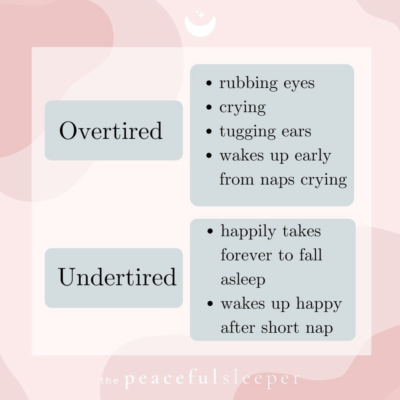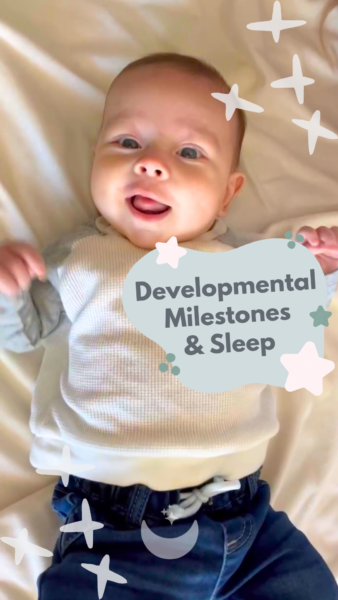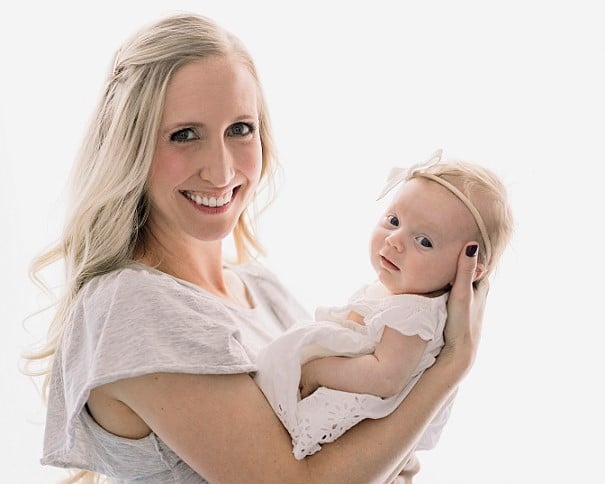Short naps are SO tough. After spending a good chunk of time getting baby down for a nap, they wake up 30-45 minutes later, if not immediately when you put them down—you’re exhausted and so is your baby. We’ve all been there!
In this blog, I’m going to go over:
3 Reasons Why Your Baby Might Be Struggling With Short Naps
How do I lengthen a short nap?
What if my baby is still struggling with short naps?
Let’s jump right in!

3 Reasons Why Your Baby Might Be Struggling With Short Naps
1. Scheduling
If scheduling is the issue, it may mean your little one is overtired or undertired.
Here’s how overtiredness works…when our babies start to get tired, their bodies start to produce sleepy chemicals. If these sleepy chemicals start moving through their bodies but they don’t get to sleep, they start to power through and their bodies start producing chemicals to override the sleepy ones.
This leads to them being “wired and tired”—it’s sooo much harder for them to settle once they’re “wired and tired.” The key is to catch your baby BEFORE, or when those sleepy chemicals start to flow. We do this by watching for sleepy cues.
Signs of overtiredness include:
- Fussing
- Rugging on their ears
- Arching their backs
- Flailing about
- Rubbing their eyes
Being UNDERtired is the opposite of being overtired, and might look like this:
- Happily taking forever to fall asleep
- Waking up happy after a short nap
Click here to check out the full “Overtired vs. Undertired” post on Instagram.
2. Difficulty connecting sleep cycles
This might happen once your baby transitions from the sleepy newborn stage and becomes more alert. The world around them becomes too exciting!
Around the 4 month mark, babies are more capable of learning to self-soothe, connect their sleep cycles, and have deeper, more restorative sleep—this makes it a great time to start the sleep training/sleep learning process.
3. Developmental Milestones
Every developmental milestone (rolling, sitting up, crawling, etc.) is such an exciting time! And it’s totally normal for sleep to be disrupted while they’re working on their new skill.
Click here to watch “Sleep & Developmental Milestones” on Instagram.
How do I lengthen a short nap?
If scheduling is the culprit, try implementing age appropriate wake windows. If you still notice short naps, try adding 15 minutes to your wake windows.
Here are the average wake windows based on age:
| Age | Number of Naps Per Day | Wake Windows Between Naps | Wake Window Before Bed |
| 0-3 months | 4-7 | 60-90 min | 1-2 hours |
| 4 months | 4 | 90 min | 2 hours |
| 5 months | 3 | 2 hours | 2.5 hours |
| 7 months | 2 | 2-3 hours | 4 hours |
| 14 months | 1 | 5 hours | 5 hours |
Remember, every baby is unique! These are just averages. Some babies do better with longer wake windows for their age, and others do better with shorter wake windows for their age.
Use age-based windows as a guide or starting point and then tweak them based on what seems optimal for YOUR baby.
If your baby is developmentally ready, another solution to short naps is teaching independent sleep initiation. During the newborn stage (0-4 months), newborns still rely on us to do the soothing for them. You can’t spoil a newborn, so don’t be afraid to pull out all the stops to help them get good sleep!
Around the 4 month mark is when most babies are ready to start the sleep learning/sleep training journey. The 4-24 Months Content Library walks you through the entire process of teaching your little one independent sleep skills.
What if my baby is still struggling with short naps?
If you’ve already taught your baby independent sleep skills and ruled out developmental milestone regressions, it might feel discouraging to still see those short naps. But don’t worry—sometimes, the solution lies in fine-tuning the details or taking a fresh look at your baby’s unique sleep needs. This is where a personalized approach can make all the difference. Small adjustments, like tweaking your nap routine, making subtle changes to the sleep environment, or experimenting with different wake windows, can often have a big impact.
Remember, every baby is different, and what works for one might not work for another. That’s why we offer one-on-one support with our team of incredible sleep consultants. Our experienced consultants can dive deep with you, analyze your baby’s specific sleep patterns, and provide tailored strategies to help extend those naps. We’re here to troubleshoot with you, provide encouragement, and support you every step of the way. You don’t have to navigate this alone—click here to check out our support options and book a consultation.

Recap on 3 Reasons Why Your Baby Might Be Struggling With Short Naps
Short naps can be incredibly frustrating for both parents and little ones, but understanding the root cause can make all the difference in getting your little one’s sleep back on track.
If you need support with your baby’s specific sleep needs or have any other questions about navigating short naps, we would love to work with you. Hop on a call with one of our AMAZING Certified Pediatric Sleep Consultants!
Whether your little one is a newborn (0-4 Months Content Library), 4-24 months (4-24 Months Content Library), or a toddler (2-5 Years Content Library), we have the resources you need to get your family the sleep you all deserve!





0 Comments